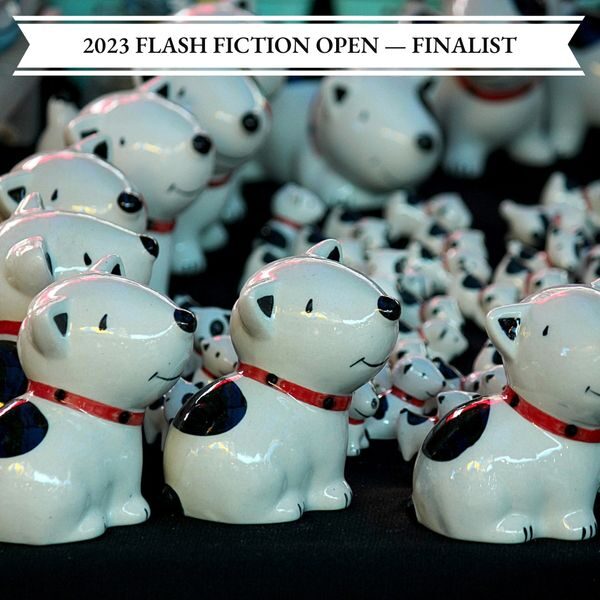
Fullness
First it was the little porcelain dogs with green glass eyes. Each one in various uniforms. A policeman bulldog, a doctor poodle, a nurse greyhound. Over a hundred and twenty in the series. She got them all. They lined the shelf. Their glass eyes watched her husband come and go.
Then, it was the crystal animals with the springs for tails. They multiplied like mad and filled the shelves, and when there wasn’t any more room on any shelf, they crowded on the space heater, and when the TV came on at night, they got excited and glittery.
Then it was parachute pants.
“So many boxes full of them that someone dumped at Goodwill,” she said, “just three dollars.”
She stacked the boxes in the living room.
“Why don’t you ever wear ‘em?” he said.
“I will,” she said, “when they come back in style.”
There were jars full of pennies that filled the pantry and the closets and boots and shoes in all sizes because a visitor who’d lost his shoes and seventeen cases of raisins she found in the back of the dollar store could come by.
“They was gonna throw ‘em out.”
She looked so proud he hesitated to say anything, but that night he did.
“You don’t like raisins.”
“It’s an acquired taste I just ain’t quite acquired one quite yet,” she said.
There were folding chairs. Thirty-seven chairs in case someone had a wedding. There were bags of charcoal in case the stove failed, and every day, there were more stacks of newspapers for when they got bored.
“Who wants to read about what happened in, lemmee see,” he said, “five years ago?” her husband said.
“Well,” she said, “history does repeat itself.”
The stacks of papers filled the rooms. And climbed up on the kitchen counters. She stacked some magazines in the refrigerator when there wasn’t any room left on the kitchen table because of the horse and buggy pictures.
“Where the hell’s the bread,” her husband said. He pushed some things around, and then he found a plastic bag wedged between the case of Sibelle Anti-Snore Chin Straps and the stacks of infant disposable diapers. The bread bag had a wad of something green in the bottom.
“Jesus, Melda,” he said.
And then one day he woke up and he couldn’t find the door.
“I don’t know,” she said, “it was there yesterday.”
He shoved some things this way and that, but it wasn’t there.
“I’m sure it’s somewhere,” Melda said.
He tried to get to the kitchen, but he had to climb up on a stack of Sansibelt slacks with reinforced elastic waistbands, sizes forty-five through sixty-three, just two dollars for the lot. He got to the top and tried to swim across the pile but fell headfirst into the tangle of old vacuum cleaners and what nots.
“Melda?”
“Yes?”
“I’m stuck. I think I cut myself.”
“Where are you?”
“In the vacuums. Where they all are. And all them plastic bumble bees.”
“I don’t know where that is.”
“Them Bumble Bees, with the buck teeth, and the signs that say Be a Sandybell Honey Sucker.”
“I don’t remember them.”
For three days, she tried to find him. She clawed through stacks of wedding dresses and pony saddles and cases of bunion pads, but his voice got so weak she couldn’t hear him anymore, and eventually, she gave up.
“I’m sorry, honey,” she called out, “I’m so sorry.”
She tried to go about her normal life, but with no doors or windows, she couldn’t get out to get things. She found a case of tiny jars and put scraps of wadded paper in them, like flower blossoms, and found little crevices to push them in. But with no food or water, soon enough, nature took its course.
As she lay there, pinned beneath a toppled stack of Life Magazines, too weak to move, she looked around and had a funny thought before she died. She thought, I wonder how a house can be so full and so empty at the same time.
Payne holds an MFA in fiction from Stonecoast. He writes short stories and plays. His piece, “Fish Story” won the New Guard Review’s Machigonne Fiction Contest. A number of his plays have won awards and have been produced in Boston, San Francisco, New York, and Maine. One ten minute play is published by Samuel French. He makes a living writing radio commercials that are heard nationally. He’s thrilled to be a part of Fractured Lit‘s publication.
Submit Your Stories
Always free. Always open. Professional rates.
